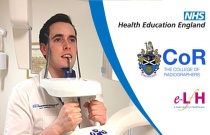Imaging of Renal Transplant Dysfunction 1
Grant Baxter
0.50 Hours
This session describes the historical and clinical background and considerations prior to renal transplantation. The normal ultrasonic grey-scale and colour Doppler appearances of the transplant kidney are also described.
Imaging of Renal Transplant Dysfunction: Late Complications
Grant Baxter
0.50 Hours
This session details the late complications that can arise following renal transplant, and the role of ultrasound in particular (among other modalities) in diagnosis.
Medico-legal Aspects of Palliative Care
Chantal Simon
0.50 Hours
This session aims to provide an overview of the major medico-legal issues likely to arise in the palliative care situation and provide GPs with clear directions on how to manage them.
Image Interpretation - Dental and Maxillo-facial Radiography: Session 3
Andrew Woodhouse and Neil Boland
0.50 Hours
This session will cover radiographic assessment of dental images including intraorals, orthopantomograms and lateral cephalograms. The radiographic appearance of a range of pathologies related to the maxilla, mandible and teeth will be discussed.
Electro-oculography
Dorothy Thompson
0.50 Hours
This session covers the underlying physiological changes measured by electro-oculography (EOG), clinical indications, how the test is carried out and the interpretation of an EOG report.
Flash Visual Evoked Potentials
Ruth Hamilton
0.50 Hours
This session covers the underlying physiological changes measured by flash visual evoked potentials (Flash VEP), clinical indications for performing the test, how it is carried out and the interpretation of a Flash VEP report.
How to do an Ophthalmology Examination
Rosemary Robinson and Ian De Silva
0.50 Hours
This session is designed to help you take a structured approach to an eye examination.
Evaluation of Vitreo-retinal Lesions
Hatem Riad Atta FRCSEd, FRCOphth, DO
0.50 Hours
This session covers the ultrasound (US) detection and diagnosis of vitreo-retinal lesions including retinal tears, retinal detachment, posterior vitreous detachment (PVD) and choroidal detachment. The role of US in the evaluation of blunt ocular trauma and detection of intra-ocular foreign body (IOFB) will also be covered.
Liberating Learning - Patient Based Strategy
Stephen Ellis
0.50 Hours
This session explores patient-based learning activities, either with or without the patient being present. It demonstrates these with videos of case scenarios and offers practical suggestions to liberate learning.
Image Interpretation - Plain X-rays of the Adult Chest: General Anatomy and Physiology
Nick Woznitza
0.50 Hours
This session will look at anatomy of the thoracic cavity and the physiology of respiration. It will focus on identifying anatomy demonstrated on diagrams.
Image Interpretation of the Paediatric Skeleton: Bone Development
Dorothy Keane
0.50 Hours
This session discusses bone development and the appearance and growth of bones in children. Examples of common normal variants and congenital abnormalities are discussed.
Image Interpretation of the Paediatric Skeleton: Pathology
Dorothy Keane
0.50 Hours
This session gives a general overview of a series of pathologies that the learner may encounter in relation to paediatric skeletal radiographs.
Image Interpretation of the Paediatric Skeleton: Suspected Physical Abuse
Claire Giles
0.50 Hours
This session aims to provide basic knowledge of how suspected physical abuse, formerly non-accidental injuries, appear on radiographs.
Image Interpretation of the Paediatric Skeleton: Suspected Physical Abuse - Case Study 1
Claire Giles
0.50 Hours
This self-evaluation session presents a case study for review regarding paediatric suspected physical abuse.
Image Interpretation of the Paediatric Skeleton: Suspected Physical Abuse - Case Study 9
Claire Giles
0.50 Hours
This self-evaluation session presents a case study for review regarding paediatric suspected physical abuse.
Normal Variants - Radiology
Ben Pearch and Elizabeth Loney
0.50 Hours
This session is designed to allow you to differentiate between normal variants and fractures around the ankle joint and foot.
Image Interpretation - Radiographs of the Adult Abdomen: Calcifications
Dorothy Keane
0.50 Hours
This session will look at the abdominal radiograph. It will focus on the appearances of abdominal calcifications and how a diagnosis can be made.
Image Interpretation - Radiographs of the Paediatric Chest: Cystic
Andrew Yeung
0.50 Hours
This session will look at disease processes that can give rise to a cystic appearance on chest radiographs.
Image Interpretation - Radiographs of the Paediatric Chest: Self-Evaluation Session 2
Dorothy Keane
0.50 Hours
A self-evaluation exercise designed to help you to assess your image interpretation skills on chest radiographs.
Managing Patients Undergoing General Anaesthesia in the MRI Unit
Barbara Nugent
0.75 Hours
This session is primarily for MRI radiographers, radiologists, physicists, clinical scientists and other relevant staff who have direct responsibility for patient and staff safety when scanning patients during General Anaesthetic (GA) sessions in an MRI unit. It outlines the additional safety measures required when dealing wi....
Image Interpretation - Obstetric Ultrasound: Introduction
Regina Fernando
0.50 Hours
This session considers the role of ultrasound in investigating obstetric conditions and discusses its value alongside other imaging modalities. Tips on equipment use, technique, orientation and reporting will be offered.
Image Interpretation - Obstetric Ultrasound: Abnormal First Trimester
Hazel Edwards
0.50 Hours
This session will discuss the ultrasound appearances of common early pregnancy complications including subchorionic haemorrhage, miscarriage, pregnancy of unknown location, ectopic pregnancy and gestational trophoblastic disease.
Image Interpretation - Obstetric Ultrasound: Applications of Doppler Ultrasound
David Cole
0.50 Hours
This session considers the use of Doppler ultrasound to investigate and monitor those pregnancies at risk of perinatal morbidity and mortality due to utero-placental insufficiency.
Image Interpretation - GI and GU: Introduction to Urinary Tract Imaging
Julie Nightingale
0.50 Hours
This session will briefly discuss the anatomy and physiology of the genito-urinary (GU) system, identify common signs and symptoms of disease and provide a brief overview of imaging techniques used to evaluate pathology.
Image Interpretation - Accessory Projections: Upper Limb
Paul Simpson
0.50 Hours
This session will describe and demonstrate a range of specialist projections of the upper limb/s, which are rarely requested and can therefore be unfamiliar to some radiographers.
























